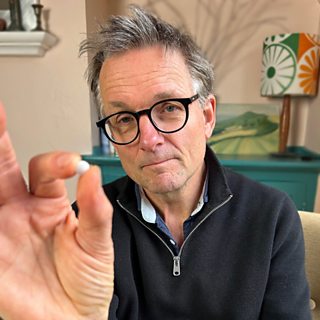How taking vitamin D could boost your brain as well as your bones
During the winter months, in the UK, there isn’t enough sunlight for most of us to make the vitamin D we need. This could have a much bigger impact on our health than we previously thought.
In Just One Thing, Michael Mosley explores how, if you are deficient in this vital vitamin, supplementing with vitamin D could bolster your immune system, making you less likely to catch a cold and quicker to recover, it may even protect you from cognitive decline and dementia, and could lift your mood!
Why we need a vitamin D supplement in winter
In the spring and summer your body can make vitamin D naturally, in your skin, from sunlight. But in winter, at least in the UK, the light just isn’t long or strong enough. Vitamin D deficiency is very common, as Dr David Llewellyn from the University of Exeter explains in the Just One Thing podcast.

There are some groups of people where it becomes even more of a health concern. “If you have dark skin you don’t produce as much vitamin D from exposure to the same amount of UV radiation,” explains David Llewellyn. In the UK, over 50% of people of South Asian descent are actually deficient in vitamin D during the winter months.
And vitamin D deficiency also becomes more common with age. That’s because our skin becomes less efficient at producing vitamin D: “More than half of older adults are below the threshold for deficiency,” says David.
Although you’ll find vitamin D in fatty fish, and to a much lesser extent in eggs, it’s really hard to get enough just through your diet – and so supplements are the way to go. The guidance in the UK is that everyone should consider taking a daily supplement containing 10 micrograms or 400 international units of vitamin D, particularly during the winter months.
Vitamin D is vital for bone health
Since its discovery in the 1920s, vitamin D’s best-known role is keeping bones healthy by increasing our body’s absorption of calcium. That’s why rickets, which used to be very common, is rare now.
But in recent years, scientists have discovered vitamin D receptors in nearly all the cells of our body, suggesting that its health benefits extend far beyond bones…
Vitamin D helps us fight off a cold
Vitamin D plays a critical role in our immune system, helping to activate it or dampen it as needed.
Research shows that people taking vitamin D supplements are less likely to get the common cold, and it also reduces how long an infection lasts. Vitamin D is essential for activating your T-cells, a key part of your immune system. If your vitamin D levels are low, then your body will be less effective at fighting off infection.

Vitamin D has anti-inflammatory properties
Scientists have discovered that vitamin D also serves an anti-inflammatory function after an infection, helping dampen down your immune system. This is key to reducing chronic inflammation, which is linked to a whole host of negative health outcomes.
I don't usually recommend supplements but I do make an exception for this oneDr Michael Mosley
Vitamin D can give your mental health a boost
Taking vitamin D really can help reduce depressive symptoms, according to a recent meta-analysis, which pulled together more than 40 randomised controlled trials from around the world.
There are vitamin D receptors present in the pre-frontal cortex, an area of the brain known to play a critical role in mood regulation.
Vitamin D could protect your brain against dementia
Taking vitamin D supplements could also protect your brain against dementia, an age-related decline.
According to a large population-based study in America following over 1600 people, those who had a vitamin D deficiency were over 50% more likely to develop Alzheimers or dementia. For those with severe deficiency that risk was more than doubled: it was about 125% higher risk, explains Dr David Llewellyn. “It was the first compelling evidence to link low levels of vitamin D in the blood to an increased risk of dementia.”
The best evidence that we have, to support the causal link between low vitamin D and dementia, comes from genetic studies where people’s own genetic profile leads them to have higher levels of vitamin D, explains David. “They seem to have a lower risk of developing dementia, so that’s quite convincing.”
How does vitamin D help the brain?
Vitamin D certainly does appear to interact with the hallmarks of Alzheimer's disease, says David. It seems to help with chopping up abnormal proteins that form in the brain, such as amyloid plaques and tau, and clearing them.
“Other scientists have argued that it also helps to protect the blood supply to the brain and reduce inflammation,” says David, “and that might be helpful with other types of dementia like vascular dementia.”
The expert advice
“Particularly in winter I think it’s worth considering taking a supplement that has at least 10mcg or 400iu of vitamin D in it,” says David, “but ultimately, if you’re concerned about your health and you think you might be at risk of severe deficiency, or you’re concerned about developing dementia in general, it’s important to talk to your GP.”
So why not give your vitamin D levels a helping hand – your bones, your immune system and your brain could benefit. From April onwards get outside in the sun (safely) to let your skin make vitamin D naturally, and in the meantime take a vitamin D supplement – keeping your vitamin D levels topped up could help you fight infections, reduce inflammation and maybe even give your brain a boost.


















































